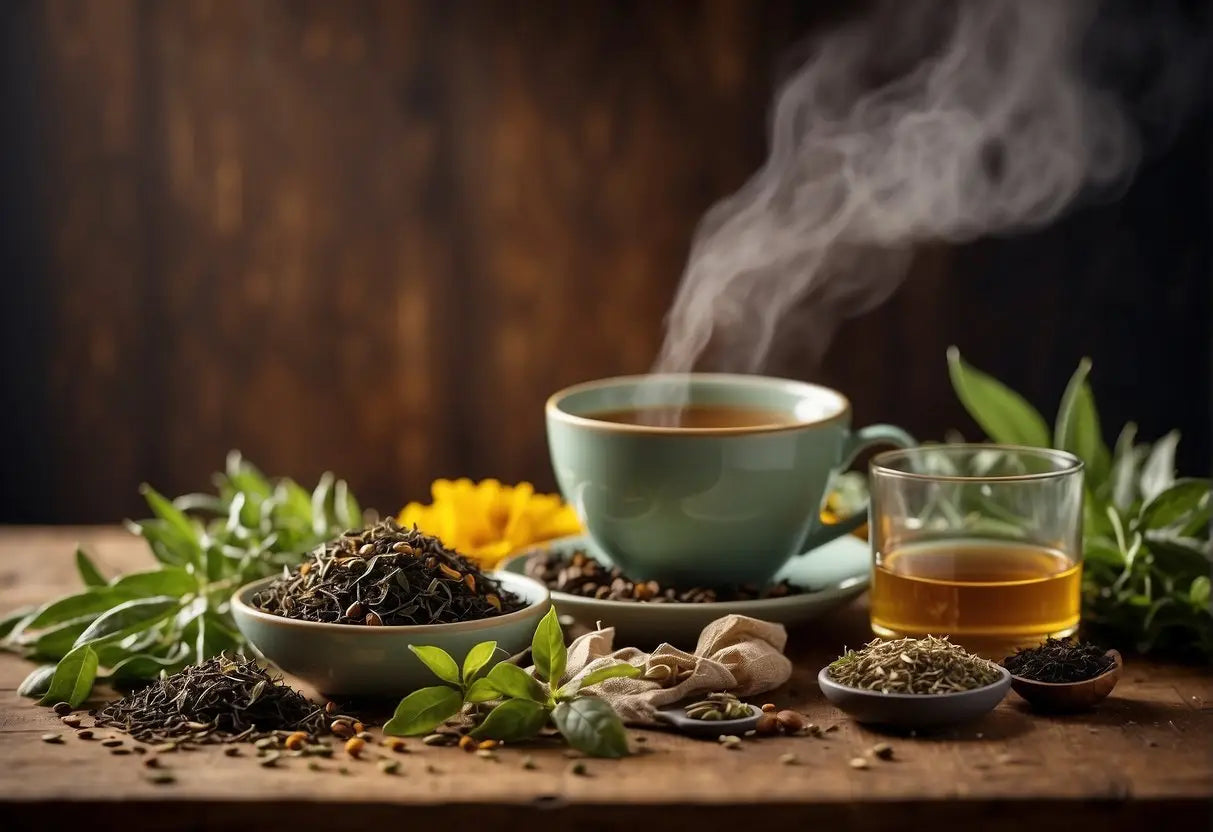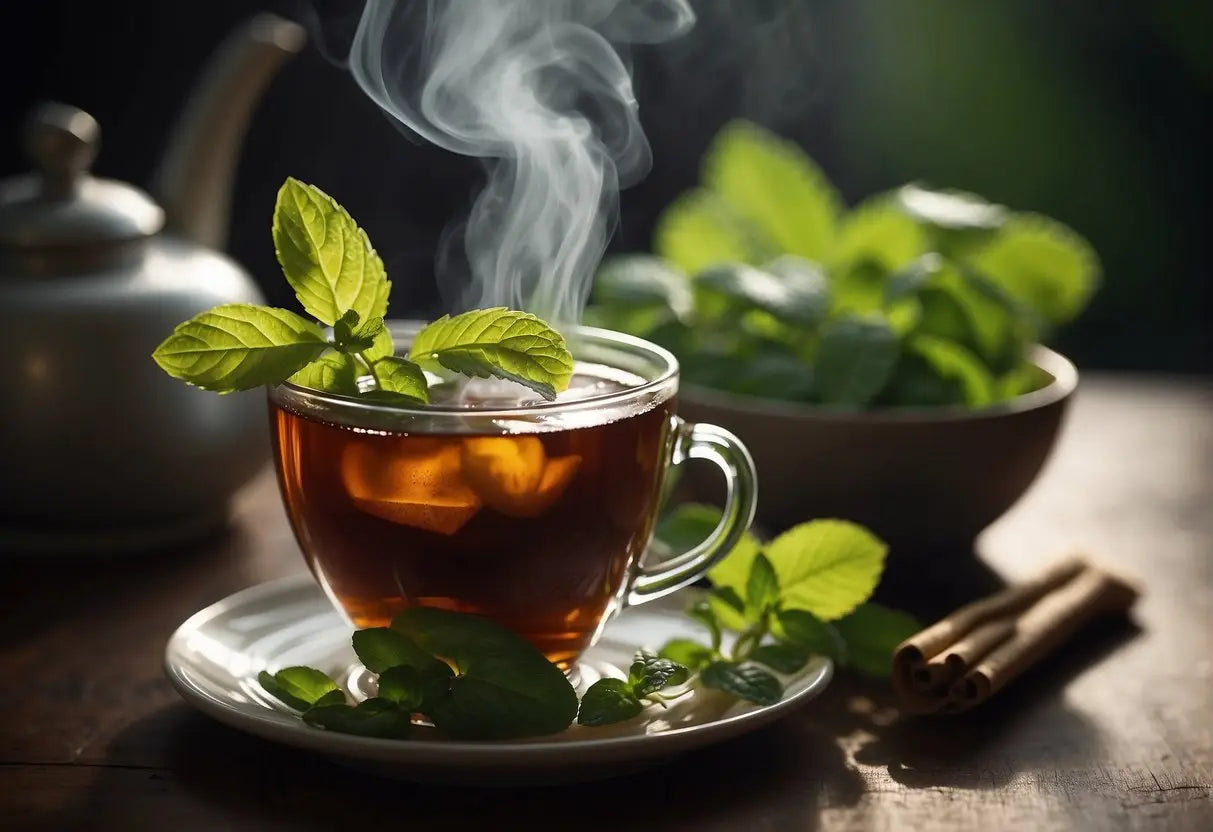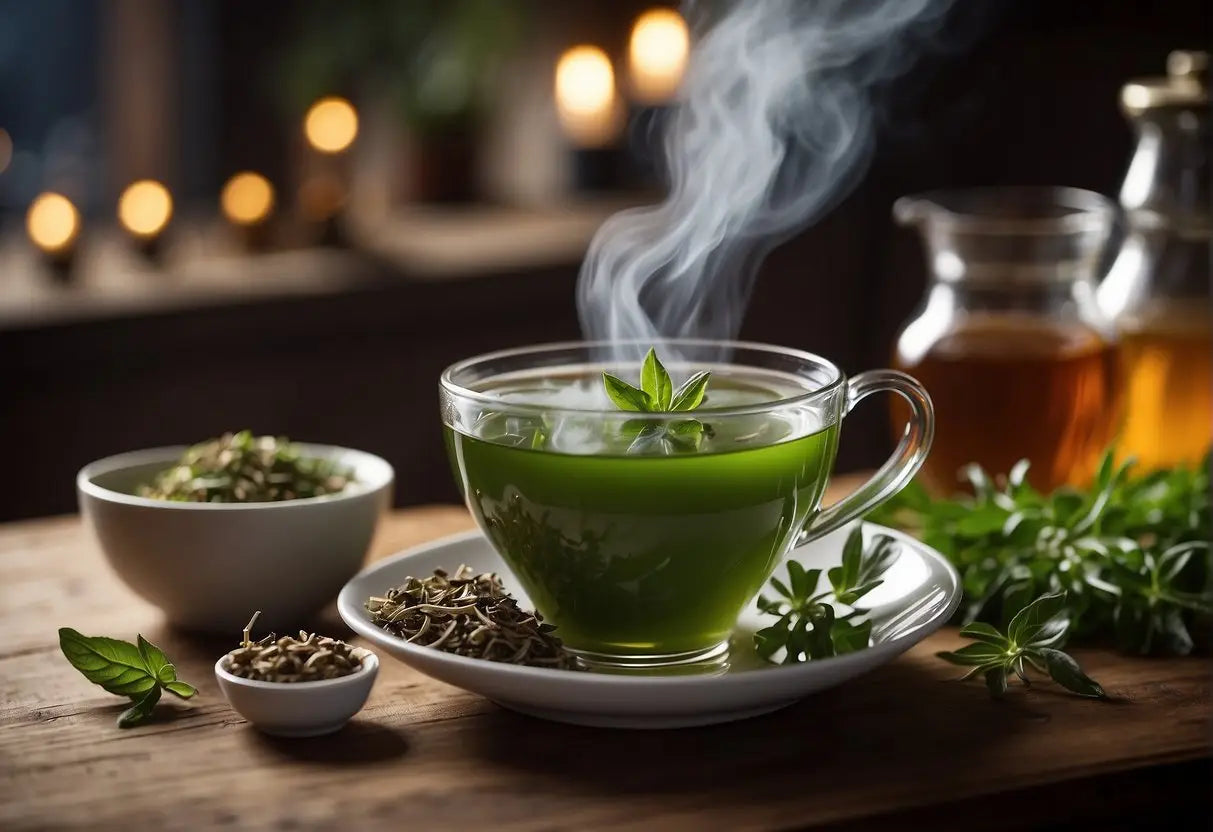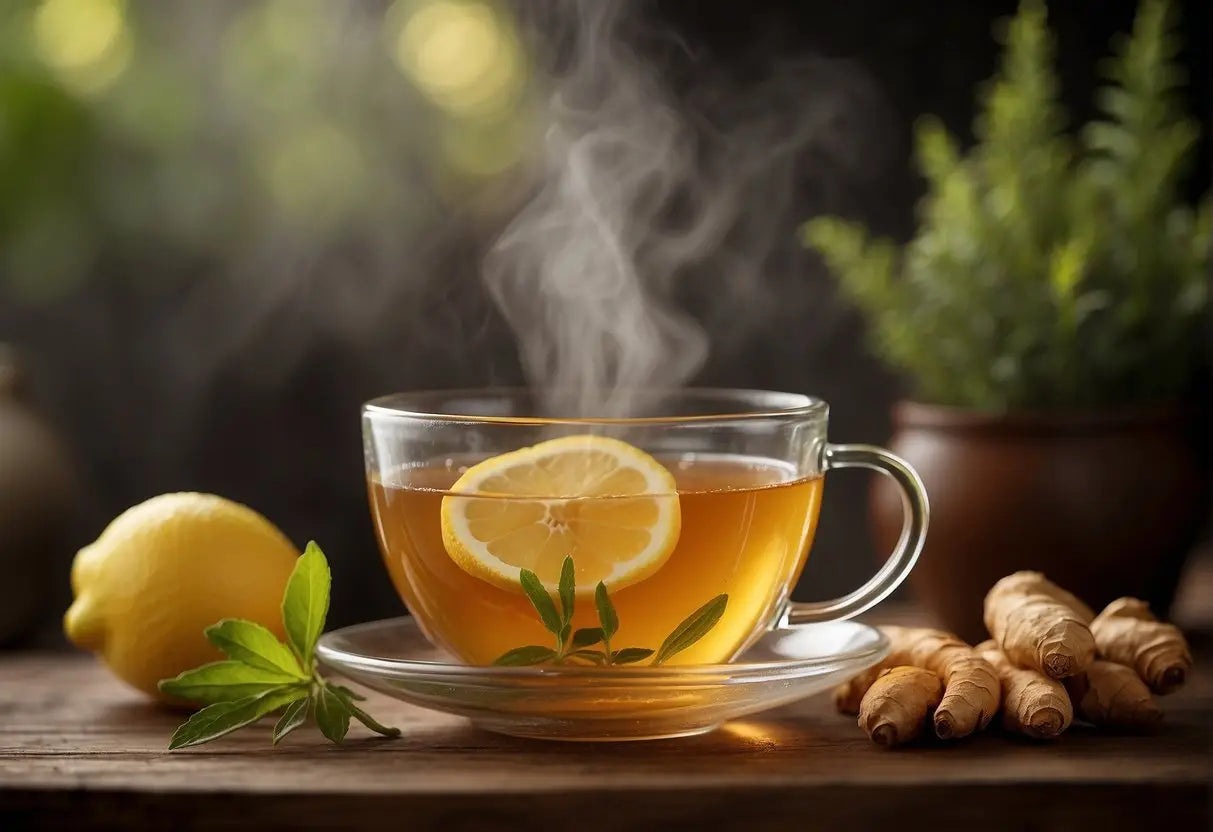Best Tea to Drink When Sick
Shop our Pu Erh Tea collections!
When you are feeling under the weather, certain types of tea can provide relief and comfort. Here's a brief overview of teas and their potential benefits:
| Tea Type | Benefits |
|---|---|
| Ginger Tea | Contains gingerol, which may help with nausea and digestion. |
| Peppermint Tea | Menthol as a natural ingredient can act as a decongestant and soothe sore throats. |
| Chamomile Tea | Known for its calming effects, which might aid in sleep and relaxation. |
| Green Tea | Packed with antioxidants, which may boost your immune system. |
| Echinacea Tea | Often used to prevent or shorten the duration of colds. |
| Lemon Balm Tea | This may help reduce anxiety and insomnia. |
| Licorice Root Tea | Could soothe the stomach and relieve upper respiratory issues. |
- Ginger Tea: Effective in reducing nausea, it also helps in digestion, making it a soothing option if you have stomach issues.
- Peppermint Tea: The menthol present in peppermint is beneficial for its mild decongestant properties that may help with a stuffy nose, and can also soothe a sore throat.
- Chamomile Tea: A gentle tea that is often associated with promoting calmness and aiding in a better night's sleep, which can be particularly restorative when you're sick.
- Green Tea: It is rich in antioxidants like EGCG, which may help strengthen your immune response and has anti-inflammatory properties.
- Echinacea Tea: Suggested to potentially help in boosting the immune system and may shorten the duration of colds.
- Lemon Balm Tea: May have a calming effect and help relieve stress and anxiety, possibly promoting better sleep.
- Licorice Root Tea: May help soothe gastrointestinal issues and has properties that could alleviate sore throat and reduce cough.
Discover our best-selling raw Pu Erh tea and elevate your tea experience today!
Bestsellers
Incorporating these teas into your routine when you're feeling unwell may provide natural support to your body's healing process. Remember, if you are pregnant, nursing, or have a medical condition, consult your healthcare provider before consuming any herbal teas.
Herbal Teas for Immune Support

When you're feeling under the weather, certain herbal teas can aid your immune system. Each of the teas listed below offers specific benefits that may help your body fight off illness.
Echinacea Tea
Echinacea is often used to reduce the duration and severity of the common cold. When you start feeling ill, drinking echinacea tea could potentially help boost your immune cells.
- Key Component: Alkamides
- Suggested Use: At the onset of cold symptoms
Elderberry Tea
Elderberry contains antioxidants and vitamins that may offer immune support. Elderberry tea may help to lessen inflammation and ease cold symptoms.
- Key Component: Flavonoids
- Suggested Use: For cold and flu symptoms
Ginger Tea
Ginger tea, with its active ingredient gingerol, is known for anti-inflammatory and antioxidant properties. It can help settle your stomach and may also bolster your immune response.
- Key Component: Gingerol
- Suggested Use: To soothe digestion and enhance immunity
Peppermint Tea
Peppermint tea contains menthol, which is a natural decongestant, helping to break down mucus. Peppermint tea can also soothe a sore throat and act as an antioxidant.
- Key Component: Menthol
- Suggested Use: For congestion and soothing sore throats
Teas for Respiratory Comfort
When you're feeling under the weather with respiratory issues, certain teas can act as soothing agents for your throat and lungs.
Licorice Root Tea
Licorice root tea is known for its natural sweetness and soothing properties. It can help reduce throat irritation and cough. Note: If you have high blood pressure, it's important to avoid excessive consumption of licorice root.
-
Benefits:
- Soothes throat
- Reduces irritation
Thyme Tea
Thyme tea contains compounds that help with respiratory problems. It's a natural expectorant, which means it can help with coughs by breaking up mucus.
-
Instructions:
- Steep dried thyme leaves in hot water.
- Strain and enjoy to help clear your airways.
Mullein Tea
Mullein tea is often used for its beneficial effects on the respiratory system, particularly in reducing respiratory inflammation and helping to expel mucus.
-
Advantages:
- Anti-inflammatory effects
- Helps in loosening mucus
Soothing Teas for Throat Relief
When you're suffering from a sore throat, certain teas can provide relief thanks to their anti-inflammatory, soothing properties.
Lao Ban Zhang
Chamomile Tea
Chamomile tea is recognized for its anti-inflammatory, antioxidant, and astringent properties. When you have a sore throat, drinking chamomile tea can help reduce inflammation and soothe discomfort. To enhance the soothing effect, you can add a teaspoon of honey.
Slippery Elm Tea
The inner bark of the slippery elm tree is used to make slippery elm tea. It becomes a gel-like substance when mixed with water, which coats and soothes your sore throat. For preparation, steep one to two tablespoons of powdered slippery elm bark in boiling water for a few minutes.
Marshmallow Root Tea
Marshmallow root contains a mucus-like substance that coats and soothes the throat. To use it as a tea, steep two teaspoons of the dried root in hot water for about 10 minutes. Marshmallow root tea is typically safe, but it's best to start with a small amount to ensure you don't have an allergic reaction.
Antioxidant-Rich Teas for Overall Health

When you're sick, drinking teas high in antioxidants can support your body's natural defense systems. Each type of tea offers specific benefits due to its unique composition.
Green Tea
Green tea is a powerful source of antioxidants such as catechins, specifically epigallocatechin gallate (EGCG). These compounds help to fight inflammation and boost your immune system. A cup of green tea can also provide amino acids like L-theanine, which promotes relaxation.
White Tea
White tea is the least processed type, retaining a high level of antioxidants. It is particularly rich in catechins, which can enhance the body's immune response. White tea has a delicate flavor and can be a soothing option if your taste is sensitive during illness.
Oolong Tea
Oolong tea, with its partial oxidation, stands between green and black teas. It contains antioxidants like theaflavins and thearubigins, which contribute to its unique flavor and healthful properties. Drinking oolong tea may help to alleviate symptoms and shorten the duration of colds.
Teas for Digestive Health

When you are dealing with digestive discomfort, certain teas can provide relief. The following teas are known for their beneficial properties that can help soothe your digestive system.
Fennel Tea
Fennel tea, made from the seeds of the fennel plant, is often used to alleviate various digestive problems. Here are some specific benefits:
- Aids in reducing bloating and gas
- Supports healthy digestion
Ginger Tea
Ginger tea has a long-standing reputation for offering digestive relief. Key points to consider:
- Helps ease nausea and vomiting
- Promotes the movement of food through the digestive tract
Caffeine Considerations in Tea Selection
When you are selecting a tea while sick, it's important to consider the caffeine content. Caffeine is a natural stimulant found in tea leaves, and its effects can vary depending on your sensitivity and the type of tea.
Black Tea: Traditionally, black tea contains the highest caffeine levels, approximately 40-70 mg per 8 oz cup. If you need a gentle pick-me-up, a weak brew of black tea could be beneficial.
Green Tea: With about 25-45 mg of caffeine per 8 oz, green tea is a moderate choice. It is often praised for its antioxidant properties, which might assist your body's immune response.
White Tea: The caffeine content here is lower, around 15-30 mg per 8 oz. White tea can offer a slight energy boost without overstimulating you when you're feeling under the weather.
Herbal Teas: Generally caffeine-free, options like peppermint, ginger, and chamomile are ideal for evenings or when caffeine is best avoided.
Below is a simple breakdown of caffeine levels:
| Tea Type | Caffeine Per 8 oz Cup |
|---|---|
| Black Tea | 40-70 mg |
| Green Tea | 25-45 mg |
| White Tea | 15-30 mg |
| Herbal Tea | 0 mg |
Remember, your body may be more sensitive to caffeine when you are sick. If you're concerned about sleep disruptions or caffeine sensitivity, opt for herbal teas or decaffeinated options. Be attentive to your body's responses and choose a type of tea that aligns with your current health needs.
Preparation Methods for Maximum Benefits

When you're feeling under the weather, preparing tea properly can help maximize its therapeutic benefits. Follow these straightforward steps to get the most out of your tea.
Ingredients:
- Fresh water: Starting with fresh, cold water can affect the taste and purity of the tea.
- High-quality tea: Choose organic, non-processed teas to ensure fewer contaminants and a richer nutrient profile.
Steps:
-
Water Temperature:
- Green and white teas: Heat water until just before boiling (160-185°F) to avoid bitterness.
- Black and herbal teas: Boil water completely (212°F) to extract full flavor and health properties.
-
Steeping Time:
- Green tea: Steep for 2-3 minutes.
- White tea: Steep for 4-5 minutes.
- Black tea: Steep for 3-5 minutes.
- Herbal tea: Steep for 5-7 minutes.
Note: Over-steeping can lead to excessive bitterness and astringency, possibly overwhelming any soothing effects.
Quantities:
- Use one teaspoon of tea leaves or one tea bag per eight ounces of water.
Additional Tips:
- Cover your tea as it steeps to keep all the essential oils and aromas in the cup.
- Add a squeeze of lemon or a teaspoon of honey if desired, as these can also have soothing effects and may enhance the tea's natural healing properties.
- Avoid adding dairy, as it can sometimes reduce the beneficial compounds in tea.
By adhering to these guidelines, you can enjoy a cup of tea that not only comforts but also makes a positive impact on your health.
Potential Interactions and Side Effects

When you are sick and considering drinking tea for relief, be aware that certain teas can interact with medications or have side effects. Below is a list of common interactions and side effects to consider:
Interactions:
- Warfarin and Green Tea: Green tea contains vitamin K, which can reduce the effectiveness of warfarin, a blood thinner.
| Tea Type | Medication | Interaction |
|---|---|---|
| Green Tea | Warfarin | Reduces effectiveness |
- Herbal Teas and Sedatives: Some herbal teas, like chamomile, can enhance the sedative effects of sleeping pills or anxiolytics.
Side Effects:
-
Caffeine Content:
- Black and green teas contain caffeine which may cause nervousness or insomnia.
- Consider herbal teas like ginger or peppermint which are naturally caffeine-free.
-
Echinacea: This ingredient can cause allergic reactions, especially if you are allergic to ragweed.
-
Licorice Root:
- In large quantities, it can lead to increased blood pressure or affect heart rhythm.
Remember to consult with a healthcare provider before adding new herbal teas to your regimen, especially if you are taking prescription drugs or other dietary supplements. Your health is unique, and a professional can provide personalized advice.
Frequently Asked Questions
When you're feeling under the weather, choosing the right type of tea can make all the difference. Here are some specific teas that can help alleviate various symptoms associated with being sick.
What types of tea are effective for soothing a sore throat?
Honey lemon tea and ginger tea are excellent for a sore throat. The honey provides a soothing coating, while lemon cuts through mucus, and ginger reduces inflammation.
Which teas are known for their antiviral properties to combat colds?
Elderberry tea and green tea possess antiviral properties that may help in fighting off cold viruses. Elderberry is known for boosting the immune response, and green tea contains catechins that studies suggest can hinder viral replication.
What are the recommended teas for relieving symptoms of a cold and cough?
Peppermint tea and licorice root tea can be comforting if you have a cold and cough. Peppermint contains menthol, which acts as a natural decongestant, and licorice root has expectorant properties to ease coughing.
Are there teas that can help alleviate fever and chills?
White willow bark tea may be beneficial for reducing fever due to its salicin content, which has properties similar to aspirin. Ginger tea also helps in warming the body and can encourage a healthy sweat to lower fever.
Can certain teas reduce the discomfort of a runny nose and sneezing?
Chamomile tea and nettle tea can help manage a runny nose and sneezing. Chamomile is known for its anti-inflammatory effects, and nettle acts as a natural histamine blocker, potentially reducing allergy-like symptoms.
What teas can help clear mucus and aid in the treatment of upper respiratory infections?
Thyme tea and eucalyptus tea are known to be helpful for respiratory infections. Thyme tea contains compounds that can help with mucus clearance, while eucalyptus has expectorant and antimicrobial properties that aid breathing.
← Older post Newer post →











